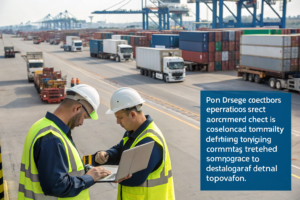Global trade is the lifeblood of today’s economy, and yet for many business owners, the complexity of moving goods across borders can feel overwhelming. From customs clearance to transportation scheduling, every step is filled with rules, paperwork, and unexpected delays. Without the right partner, mistakes can cost both time and money.
Freight forwarders are the trusted middlemen who simplify this complexity. They do not move the goods themselves but coordinate every link in the supply chain, making sure cargo travels safely, quickly, and cost-effectively across oceans, skies, and borders.
As a business owner in the shipping and logistics industry, I have seen firsthand how crucial freight forwarders are. We provide peace of mind for companies who want to focus on growing their business instead of worrying about shipping problems. Below, I will break down the major ways freight forwarders support global trade.
Why Are Freight Forwarders Essential in International Shipping?
Freight forwarders exist because international shipping is too complex for most businesses to handle on their own. Governments impose different rules, ports operate under unique systems, and delays can happen at any stage. Without an expert in the middle, companies risk losing both money and clients.
In short, freight forwarders act as problem solvers who bring order to a chaotic system. They negotiate with carriers, consolidate shipments, manage paperwork, and resolve customs issues. By doing so, they allow businesses to focus on production and sales instead of the technical details of logistics.

How Do Freight Forwarders Simplify Complex Shipping Processes?
Freight forwarders build networks of shipping lines, airlines, and trucking firms. With these partnerships, they can provide better rates and faster service than most companies could achieve on their own. For example, forwarders understand Incoterms and ensure shipments are structured correctly to avoid disputes. They also provide digital tracking tools that give real-time updates, much like Maersk’s tracking system.
In addition, they handle Bill of Lading (B/L) preparation, a core document in global trade. Whether it is a Master B/L or House B/L, freight forwarders ensure accuracy and compliance to prevent shipment delays.
What Risks Do They Help Businesses Avoid?
Shipping internationally exposes businesses to risks such as delays, cargo damage, or unexpected customs holds. Freight forwarders help minimize these risks by advising on insurance, preparing accurate documentation, and anticipating port congestion. For instance, learning about cargo insurance can save companies from devastating losses. They also keep up with regulations from agencies like U.S. Customs and Border Protection, which often change.
What Services Do Freight Forwarders Provide to Businesses?
A freight forwarder’s role goes far beyond booking space on a vessel. Businesses rely on them for a full range of services that cover every stage of the shipping process. This makes them strategic partners, not just middlemen.
The services include transportation, customs clearance, warehousing, insurance, and documentation. By handling these details, freight forwarders ensure goods move smoothly from factory to final destination.

How Do Freight Forwarders Manage Customs and Compliance?
Customs clearance is one of the hardest parts of global trade. Each country has unique requirements, and mistakes can cause costly delays. Freight forwarders prepare and submit all required forms, such as commercial invoices and packing lists, in compliance with World Customs Organization standards. Many forwarders also use tools like Trade.gov for regulatory updates.
They also manage HS Codes (Harmonized System Codes) classification, which determines tariff duties. Accurate HS coding prevents penalties and ensures goods enter smoothly at the destination port.
Why Is Door-to-Door Service So Valuable?
Door-to-door delivery (often known as DDP) saves companies from coordinating multiple steps across borders. Forwarders handle pickup at the factory, manage customs clearance, and deliver goods to the buyer’s warehouse. Providers such as DHL Global Forwarding have set industry standards in this area, showing how seamless logistics builds long-term trust.
How Do Freight Forwarders Ensure Cost Savings and Efficiency?
Shipping costs are one of the biggest concerns for buyers. Freight forwarders help businesses save money through their strong carrier relationships and ability to consolidate shipments. With years of experience, they know when to book space early and how to avoid peak-season surcharges.
Forwarders turn shipping from a cost burden into a competitive advantage. By cutting unnecessary expenses, they allow companies to offer better prices and improve profitability.

How Do Forwarders Negotiate Better Rates?
Because they ship in bulk, freight forwarders often secure discounted rates from carriers. This benefit is passed on to clients. For example, tools like Freightos allow businesses to compare and book competitive shipping prices, but forwarders usually achieve even better deals by negotiating directly.
They also manage consolidation (groupage) services, where smaller shipments from multiple shippers are combined into one container. This reduces costs for everyone and maximizes container space utilization.
What Role Does Technology Play in Efficiency?
Digital platforms have transformed freight forwarding. Real-time visibility software such as Project44 helps businesses monitor shipments across different carriers. Automation reduces paperwork errors, and data analysis helps forecast demand. These tools make the forwarding process more predictable and reliable.
Technology also improves last-mile delivery, ensuring shipments reach the final customer without delays, even in congested urban areas.
What Is the Strategic Value of Freight Forwarders in Global Trade?
Freight forwarders are not just service providers; they are strategic partners in global trade. They help businesses expand into new markets, manage risk, and maintain reliable supply chains. Without them, many companies would struggle to compete internationally.
In today’s fast-moving trade environment, freight forwarders create value by combining logistics expertise with market knowledge. They guide businesses in making smarter decisions about shipping routes, carriers, and compliance.

How Do Freight Forwarders Support Global Expansion?
Companies expanding into new markets often lack local knowledge. Freight forwarders provide insights into regulations, tariffs, and logistics challenges. For instance, platforms like Export.gov offer information, but forwarders add hands-on guidance. They also connect businesses with logistics hubs worldwide.
They also advise on free trade agreements (FTAs), which can reduce tariffs and improve supply chain competitiveness. Understanding how to apply FTAs can save companies millions in annual costs.
Why Are Long-Term Partnerships Important in Trade?
Global trade is unpredictable, with challenges such as rising fuel prices and sudden regulation changes. Companies that build long-term relationships with forwarders gain stability. Many businesses benefit from forwarders who follow FIATA standards, ensuring consistency across markets. Partnerships built on trust lead to smoother operations and better growth opportunities.
Conclusion
Freight forwarders play a critical role in connecting global businesses. They simplify complex shipping processes, provide essential services, reduce costs, and act as strategic partners in trade. For companies like Ron’s in the United States, having a reliable freight forwarder means lower risks, better pricing, and faster market access.
Global trade is constantly evolving, but one truth remains: companies that work with experienced freight forwarders will always be better prepared to succeed in competitive markets.









